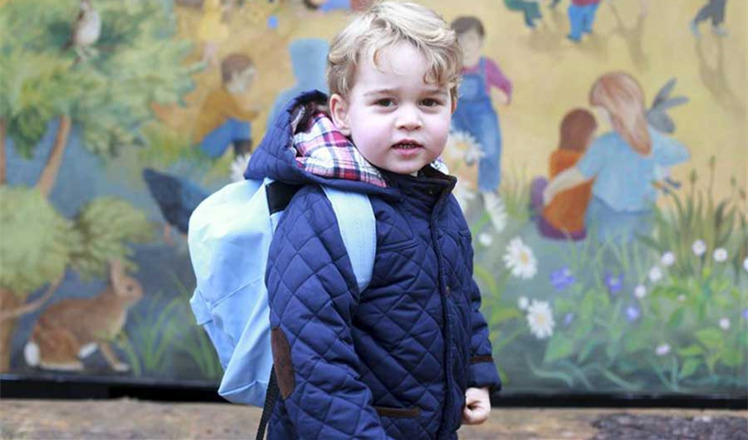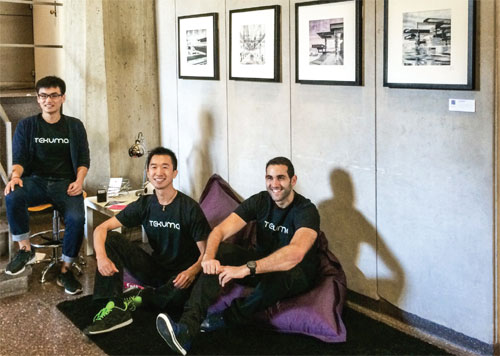Startup eyes of art patrons on the road
Updated: 2016-01-08 11:52
By Siqi Lin for China Daily(China Daily USA)
|
||||||||
If you were to stay at an Airbnb rental in Boston, you could find yourself surrounded by a collection of artworks upon entering.
You could download an app and scan the work of art. Then the artist who created it and the story behind it will reflect on your phone. If you like it, you can purchase it with your phone and have the piece shipped to your home.
That's how Tekuma works, a startup company founded by three recent alumni of the Massachusetts Institute of Technology. Tekuma curates hospitality spaces with creative content.
Artists can submit their artworks to Tekuma. The company then will find space operators such as Airbnb hosts who are willing to provide a space to showcase the artwork.
The startup's founders - Tengjia Liu, Kun Qian and Marwan Aboudib - are architecture and real estate graduates of MIT. Tekuma is the first two initials of their names. Their idea stemmed from a class they took together a year ago.
"We only had five students and two professors in the class," said Liu. "We created many architecture prototypes and computer-generated artworks for the semester.
"Every piece of our work has its own story and aesthetic values," he said. "It's very sad that we worked for three months, and only a few professors saw them."
"The way we are living today, everything has become digital," Aboudid said. "It's on a computer. There are some things you need to hold with your hands, touch and see."
Tekuma's goal is to allow creative content to be displayed in a physical way.
"So many people create beautiful things; we want to make sure that this talent can be shown in an affordable way. Meanwhile, the public can access this talent," Aboudib said.
Tekuma's initial idea was as an e-commerce venture. They printed the artworks and framed them, and then had a pop-up gallery at MIT. They wanted ro eventually create an online retail marketplace.
However, they got into trouble for printing and not asking for permission for the pop-up gallery.
"Around 10 pm at night, we didn't know what to do with the artworks in the pop-up gallery, and we were extremely tired," Qian said. "And then we came up with the idea of putting one artwork in every study room, and for each artwork, we will leave a label with the artist's name, description of the artwork, and the QR code. You can buy the artwork and take it with you."
After a month, they sold seven out of 20 pieces.
"It's amazing, because we realize we add a value to the study room, to the space, and we add a value to the artworks," Aboudib said.
They then applied to the MIT Global Founders' Skills Accelerators. After several rounds of interviews, they were accepted into the program and formed one of 12 teams from among 130 applicants.
"We really choose students over the idea. What we want to find are the students who have the passion to be entrepreneurs," said Trish Cotter, entrepreneur in residence at Martin Trust Center for MIT Entrepreneurship. "Tekuma (with) very little entrepreneurship training were taken in because of the desire and passion of the team."
"The sweet spot of a typical Silicon Valley company is when the marketing side is viral, and the content side is also viral," Joi Ito, MIT media lab's director, said at the opening of the demo. "So when both sides are viral, you don't have to inject any money; all you have to do is instrument everything and keep tuning the virality on both sides. It scales."
"Art needs space; space needs art," Aboudib said during Tekuma's presentation.
Tekuma is building a business-to-business platform. The three men just graduated from MIT in December and then will work on Tekuma full time. They recently welcomed another team member Naomi Hebert who is taking the role of Tekuma's head of growth.
Tekuma recently partnered with the MIT Council of Art to host an art gallery during the Miami Art Basel in December. The company is also working with Flatbook, which offers furnished spaces for nightly and monthly stays in cities across the world, and Inteahouse, a Cambridge-based incubator that is expanding its entrepreneurship network globally. They said they are open to any spaces and won't be limited to artwork in the long run.
They are working on a pricing strategy and building the web platform.
Qian said he is confident in Tekuma's prospects but is concerned about the possibility of not being able to stay in the United States after one year, because they are all international students.
"We need to go through the H-1B (visa) process; it might be very hard for three of us to get the lottery," Qian said.
"America is an amazing place, and we started here, we do amazing things here, and hopefully America allows us to stay. If not, the world is huge; there're so many opportunities for us," he said.
"We are always trying to create a global company. Hopefully it can be (in the) US, but we are ready to embrace the possibility of moving to new places."
|
The founders of Boston startup Tekuma (from left) Tengjia Liu, Kun Qian and Marwan Aboudib |
(China Daily USA 01/08/2016 page11)
- Obama says US must act on gun violence, defends new gun control rules
- Over 1 million refugees have fled to Europe by sea in 2015: UN
- Turbulence injures multiple Air Canada passengers, diverts flight
- NASA releases stunning images of our planet from space station
- US-led air strikes kill IS leaders linked to Paris attacks
- DPRK senior party official Kim Yang Gon killed in car accident

 Vivid dough sculptures welcome Year of the Monkey
Vivid dough sculptures welcome Year of the Monkey
 Kidnapped five-year-old reunites with her family 56 hours later
Kidnapped five-year-old reunites with her family 56 hours later
 Kung Fu Panda hones skills from master
Kung Fu Panda hones skills from master
 New cars shine at the 2016 CES trade show
New cars shine at the 2016 CES trade show
 Britain's Prince George attends first day of nursery school
Britain's Prince George attends first day of nursery school
 What's in store at CES 2016
What's in store at CES 2016
 Li springs a surprise on coal mine visit
Li springs a surprise on coal mine visit
 Man proposes to his beloved with a $23,010 ghost castle
Man proposes to his beloved with a $23,010 ghost castle
Most Viewed
Editor's Picks

|

|

|

|

|

|
Today's Top News
Shooting rampage at US social services agency leaves 14 dead
Chinese bargain hunters are changing the retail game
Chinese president arrives in Turkey for G20 summit
Islamic State claims responsibility for Paris attacks
Obama, Netanyahu at White House seek to mend US-Israel ties
China, not Canada, is top US trade partner
Tu first Chinese to win Nobel Prize in Medicine
Huntsman says Sino-US relationship needs common goals
US Weekly

|

|
